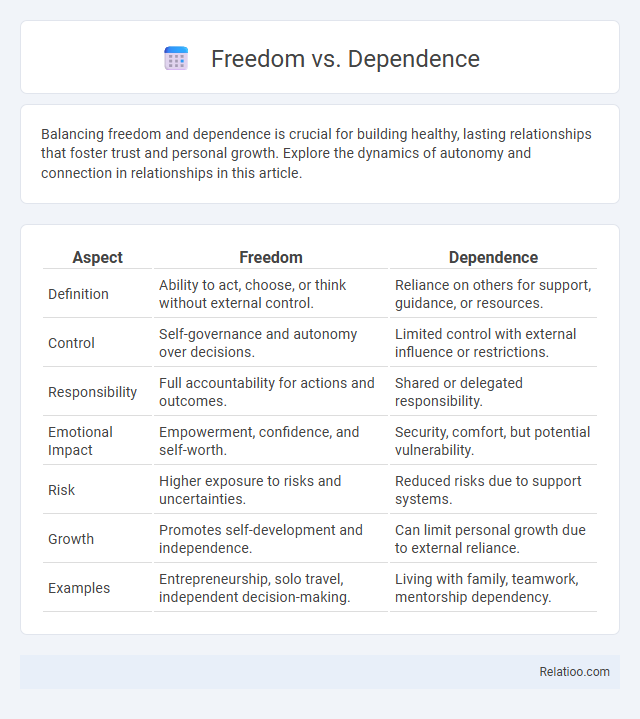Balancing freedom and dependence is crucial for building healthy, lasting relationships that foster trust and personal growth. Explore the dynamics of autonomy and connection in relationships in this article.
Table of Comparison
| Aspect | Freedom | Dependence |
|---|---|---|
| Definition | Ability to act, choose, or think without external control. | Reliance on others for support, guidance, or resources. |
| Control | Self-governance and autonomy over decisions. | Limited control with external influence or restrictions. |
| Responsibility | Full accountability for actions and outcomes. | Shared or delegated responsibility. |
| Emotional Impact | Empowerment, confidence, and self-worth. | Security, comfort, but potential vulnerability. |
| Risk | Higher exposure to risks and uncertainties. | Reduced risks due to support systems. |
| Growth | Promotes self-development and independence. | Can limit personal growth due to external reliance. |
| Examples | Entrepreneurship, solo travel, independent decision-making. | Living with family, teamwork, mentorship dependency. |
Understanding the Concepts: Freedom and Dependence
Freedom represents the state of having autonomy and control over Your choices and actions, enabling self-determination without external constraints. Dependence involves relying on others or external factors for support, guidance, or resources, which can limit individual agency and decision-making power. Understanding the balance between freedom and dependence helps in recognizing when reliance enhances growth or impedes personal liberation.
Historical Perspectives on Liberty and Reliance
Historical perspectives on liberty and reliance reveal a complex interplay between freedom and dependence, where societies have oscillated between valuing individual autonomy and recognizing collective interdependence. Philosophers from John Locke to Jean-Jacques Rousseau debated the balance between personal liberty and social contracts that create mutual reliance, shaping modern democracies. Understanding this dynamic helps You appreciate how historical contexts influence contemporary views on your freedom within communal systems.
The Psychological Impact of Freedom vs Dependence
The psychological impact of freedom versus dependence significantly influences mental health and well-being. Freedom fosters autonomy, self-efficacy, and intrinsic motivation, leading to higher life satisfaction and reduced anxiety. In contrast, dependence often correlates with feelings of helplessness, lower self-esteem, and increased stress, potentially resulting in learned helplessness or depression.
Economic Dimensions: Independence in Financial Life
Economic independence empowers you to make financial decisions without reliance on others, fostering personal growth and security. Dependence on external income sources limits your financial freedom and can create vulnerabilities during economic downturns. Strengthening your financial autonomy through diversified income streams and disciplined savings enhances long-term stability and resilience.
Cultural Influences on Attitudes Toward Autonomy
Cultural influences significantly shape attitudes toward autonomy, with individualistic societies prioritizing personal freedom and self-expression, while collectivist cultures value dependence and social harmony. In independent contexts, autonomy is linked to self-determination and personal achievement, whereas interdependent cultures emphasize relational responsibilities and group cohesion. These divergent cultural frameworks affect how freedom and dependence are perceived, impacting social behavior and decision-making processes.
Social Structures: Community, Family, and Individual Choice
Social structures such as community and family significantly influence the balance between freedom and dependence by shaping individual choice through shared values, support systems, and social expectations. Communities provide a network that can both enable personal freedom through collective resources and impose dependence via social norms, while family units often create interdependent relationships that limit autonomy but enhance security. Individual choice emerges within this dynamic interplay, reflecting a negotiation between the desire for personal freedom and the practical reliance on social connections.
Technological Advancements: Empowerment or Entrapment?
Technological advancements offer unprecedented freedom by enabling You to access information, communicate globally, and automate tasks, significantly enhancing productivity and personal empowerment. However, increasing dependence on technology risks entrapment through data privacy concerns, algorithmic control, and reduced critical thinking, which can limit true autonomy. Balancing freedom and dependence requires conscious use of technology to maximize benefits while minimizing vulnerabilities to digital manipulation and overreliance.
Navigating Personal Relationships: Boundaries and Support
Navigating personal relationships requires balancing freedom and dependence by establishing clear boundaries that protect individual autonomy while fostering mutual support. Healthy boundaries enable partners to maintain personal identities and prevent codependency, promoting emotional resilience and trust. Support within relationships thrives when freedom is respected, allowing open communication and collaborative growth without compromising independence.
Legal Frameworks: Rights, Obligations, and Control
Legal frameworks establish the balance between freedom and dependence by defining your rights, obligations, and the scope of control exerted by governing bodies. Rights ensure individual autonomy and protection, while obligations impose duties that maintain social order and legal compliance, often limiting absolute freedom. Control mechanisms, embedded in laws and regulations, regulate behavior to safeguard community interests without entirely undermining personal liberty.
Striking the Balance: Achieving Healthy Autonomy
Striking the balance between freedom and dependence is essential for achieving healthy autonomy, where you maintain independence without isolating yourself from necessary support. Healthy autonomy thrives when personal boundaries are respected while allowing interdependence in relationships, promoting growth and resilience. Establishing this equilibrium empowers you to make confident decisions, fostering emotional well-being and sustainable self-reliance.

Infographic: Freedom vs Dependence
 relatioo.com
relatioo.com